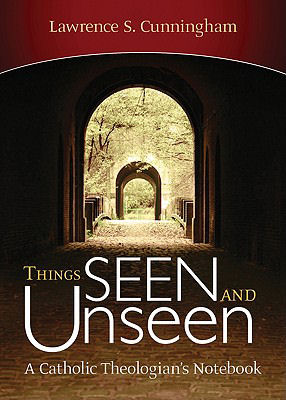
|
Posted September 26, 2010
Book: Things Seen and Unseen: A Catholic Theologian’s Notebook Author: Lawrence S. Cunningham Sorin Books. Notre Dame, IN. 2010. Pp. 242 An Excerpt from the Book:
. . . . Karl Rahner once was asked about his life as a Jesuit theologian: what he said, mutatis mutandis and to a far lesser degree, resonates with my own experience and my own life as I look back on it after nearly four decades of teaching at the university level: “I did not lead a life. I worked, wrote, taught, tried to do my duty and earn a living. I tried this ordinary way of serving God.” Contained in this volume are slices from my ordinary life. An Excerpt from the Book: In reading Kevin Seasoltz’s very fine book God’s Gift Giving, he reminded me that the root f the word “decision” is a Latin verb that means to cut off or to amputate. To make a decision is, in effect, to cut off alternative choices. Obviously, this “cutting off” often operates at the very trivial level: to choose the blue shirt cuts off the choice of the yellow one just as the choice of the lamb chops means that one will not have the salmon for supper. However, at a deep existential level, to decide is analogous to convert.: thus, to decide for a life of following Christ inevitably means to decide against another way of life. Thus, I see in this decision an analogue to conversion, since conversion involves an act of aversion (turning away from) just as a deep decision means the erasure of the other alternatives. This deeper sense of “decision” adds pungency to the Gospel. When Jesus says “come follow me” one must respond with a decision yes or no or perhaps, later. When the young man living amid the swine of the “far away country” decides to return home to his father, his choice implicates him in a whole new set of circumstances, some from the past (repudiation of his former style of life) and some, not fully realized, about his future: how will it be at home? Seasoltz mad his etymological point in passing in the midst of his very fine analysis of the nature of “gift.” One sees the ramification immediately: God freely offers a gift — namely, his Son. It is of the essence of the gift that it has to be both offered and accepted. In a sense, the term ‘Gift” is common enough, but reading this book has made me alert to something: we tacitly grasp the word’s meaning, but fail to recognize how rich the concept of gift really is. After all, gift is closely tied to grace in general and the theology of grace in particular. The gift metaphor also helps us to destabilze the too often reached metaphor of grace as some kind of spiritual liquid “pour out” on us. . . . . If the following is true, then the implications are staggering: if one adds up the total income of the 500 richest people in the world, the sum is greater than the income of the 419 million poorest people in the world. Redistribution would not solve the problem, but a problem it is when one simply considers the above fact. |
|
